| Srl | Item |
| 1 |
ID:
073079
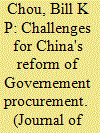

|
|
|
| 2 |
ID:
129259
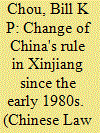

|
|
|
|
|
| Publication |
2012.
|
| Summary/Abstract |
During the reform era, the Chinese government's policies in Xinjiang have changed from accommodating to hardening. The alienation of ethnic minorities caused by the Cultural Revolution necessitated loosening of controls on cultural and religious freedom. With increasing incidents of disturbance leading up to the late 1980s, however, the Chinese government became more coercive on internal security and more generous with economic and development assistance. The global war against Islamic terrorism allowed China to justify a crackdown on the re-sistance in Xinjiang. The 2009 Ürümqi riot proved that the government's policies had failed to stabilize the region, but the Chinese government's countermeasure was to step up, not drop, the repressive policies
|
|
|
|
|
|
|
|
|
|
|
|
|
|
|
|
| 3 |
ID:
061502
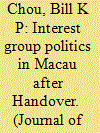

|
|
|
| 4 |
ID:
116563
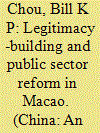

|
|
|
|
|
| Publication |
2012.
|
| Summary/Abstract |
Public sector reform has been an important strategy for the Macao government to build up its legitimacy since the handover of sovereignty. This article outlines the background of the legitimacy crisis that can be traced back to the administrative problems during the colonial era. Public sector reform in the post-handover era can be divided into two phases. Remarkable legitimacy-building was evident during the first phase of the reform that focused on the technicality of administrative efficiency and work performance. With a looming crisis of legitimacy in 2006, the Macao government continued to rely on the reform of the technical aspects of the administration by taking the approach of wider public consultation in the second phase of the reform. What have been left unreformed are the institutional shortcomings that hold back public participation and weaken the autonomy of public administration. The cause of the legitimacy crisis starting in the mid-2000s was the failure to introduce wider public involvement in public affairs and the maintaining of limited administrative autonomy. The path dependence of the second phase of the reform can hardly tackle the key factors of the new legitimacy crisis.
|
|
|
|
|
|
|
|
|
|
|
|
|
|
|
|
| 5 |
ID:
138446
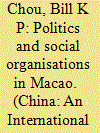

|
|
|
|
|
| Summary/Abstract |
Major social organisations in Macao fulfil the political and social functions of political mobilisation and participation, the provision of social services on behalf of the government and the co-optation of social forces by being the agents of the Chinese government in the execution of its united front policy and the vehicles of the Macao government for winning supporters. From the perspective of historical institutionalism, Macao’s political design, which centres on social organisations and dates back to the Portuguese era, is path-dependent on the modified corporatist model. By embedding social organisations into its political institution, the state can mobilise social forces to undertake state functions and weaken political opposition. Major social organisations face major challenges in their conflicting political and social functions, which weaken their ability to fulfil the role of the government’s partners and allies.
|
|
|
|
|
|
|
|
|
|
|
|
|
|
|
|